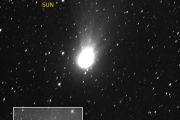
Copernical Team
Eutelsat and NIGCOMSAT forge partnership to expand satellite services in Nigeria
 NIGCOMSAT has announced a major multi-year, multi-million-dollar partnership aimed at introducing low Earth orbit (LEO) satellite services in Nigeria. This pivotal agreement designates NIGCOMSAT as the primary satellite service provider in Nigeria, leveraging the OneWeb LEO satellite network to deliver high-speed, low-latency connectivity.
NIGCOMSAT has announced a major multi-year, multi-million-dollar partnership aimed at introducing low Earth orbit (LEO) satellite services in Nigeria. This pivotal agreement designates NIGCOMSAT as the primary satellite service provider in Nigeria, leveraging the OneWeb LEO satellite network to deliver high-speed, low-latency connectivity. Zenno expands superconducting space technologies in Japan
 New Zealand-based Zenno Astronautics (Zenno) has entered into a Memorandum of Understanding (MOU) with ANA Trading to introduce Zenno's superconducting space technologies to the Japanese market.
ANA Trading, a division of Japan's premier airline conglomerate ANA Group, is leveraging its aerospace expertise under the group's strategic initiative, "Next Stop, Space," to explore space-focused
New Zealand-based Zenno Astronautics (Zenno) has entered into a Memorandum of Understanding (MOU) with ANA Trading to introduce Zenno's superconducting space technologies to the Japanese market.
ANA Trading, a division of Japan's premier airline conglomerate ANA Group, is leveraging its aerospace expertise under the group's strategic initiative, "Next Stop, Space," to explore space-focused National Astronomy Week illuminates February with rare planet parade
 A rare celestial display featuring Venus, Mars, Jupiter, and Saturn will dazzle stargazers during National Astronomy Week 2025, which runs from February 1-9. Complementing the planet parade, the Moon will pass through its phases from crescent to nearly full, creating a spectacular backdrop.
More than 250 activities, including stargazing events, planetarium shows, and talks, are planned acr
A rare celestial display featuring Venus, Mars, Jupiter, and Saturn will dazzle stargazers during National Astronomy Week 2025, which runs from February 1-9. Complementing the planet parade, the Moon will pass through its phases from crescent to nearly full, creating a spectacular backdrop.
More than 250 activities, including stargazing events, planetarium shows, and talks, are planned acr Einstein Probe identifies ancient cosmic event
 Einstein Probe has unveiled a fresh perspective on the distant X-ray Universe, enabling astronomers to investigate the origins of the farthest cosmic explosions. Just three months after its launch, the spacecraft detected an enigmatic X-ray burst that could challenge our understanding of gamma-ray bursts (GRBs).
On March 15, 2024, the spacecraft's Wide-field X-ray Telescope (WXT) captured
Einstein Probe has unveiled a fresh perspective on the distant X-ray Universe, enabling astronomers to investigate the origins of the farthest cosmic explosions. Just three months after its launch, the spacecraft detected an enigmatic X-ray burst that could challenge our understanding of gamma-ray bursts (GRBs).
On March 15, 2024, the spacecraft's Wide-field X-ray Telescope (WXT) captured NASA invests in studies for sustainable Lunar exploration
 NASA has awarded a series of new study contracts aimed at advancing capabilities to support life and work on the Moon. These initiatives are part of the Artemis program, the agency's strategy for deep space exploration, and include contracts with nine U.S. companies across seven states.
The Next Space Technologies for Exploration Partnerships Appendix R contracts are focused on addressing
NASA has awarded a series of new study contracts aimed at advancing capabilities to support life and work on the Moon. These initiatives are part of the Artemis program, the agency's strategy for deep space exploration, and include contracts with nine U.S. companies across seven states.
The Next Space Technologies for Exploration Partnerships Appendix R contracts are focused on addressing Blue Ghost enroute dispatched to Luna with help of Rocket Lab software
 Rocket Lab is playing a key role in the 45-day journey of Firefly Aerospace's Blue Ghost spacecraft to the Moon, providing its advanced MAX Flight and MAX Ground Data Software suites.
The company has also contributed three cutting-edge photovoltaic assemblies, featuring interconnected space-grade solar cells. These assemblies, strategically mounted on the spacecraft's top deck and sides, d
Rocket Lab is playing a key role in the 45-day journey of Firefly Aerospace's Blue Ghost spacecraft to the Moon, providing its advanced MAX Flight and MAX Ground Data Software suites.
The company has also contributed three cutting-edge photovoltaic assemblies, featuring interconnected space-grade solar cells. These assemblies, strategically mounted on the spacecraft's top deck and sides, d A less 'clumpy,' more complex universe?
 Across cosmic history, powerful forces have acted on matter, reshaping the universe into an increasingly complex web of structures. Now, new research led by Joshua Kim and Mathew Madhavacheril at the University of Pennsylvania and their collaborators at Lawrence Berkeley National Laboratory suggests our universe has become "messier and more complicated" over the roughly 13.8 billion years it's b
Across cosmic history, powerful forces have acted on matter, reshaping the universe into an increasingly complex web of structures. Now, new research led by Joshua Kim and Mathew Madhavacheril at the University of Pennsylvania and their collaborators at Lawrence Berkeley National Laboratory suggests our universe has become "messier and more complicated" over the roughly 13.8 billion years it's b New Shepard's 29th mission to simulate Lunar Gravity
 Blue Origin is preparing for the 29th flight of its New Shepard rocket, set to launch on January 28 at 10:00 AM CST / 1600 UTC from Launch Site One in West Texas. The mission, known as NS-29, will simulate the Moon's gravity for the first time and carry 30 payloads, nearly all of which are focused on testing technologies crucial for lunar exploration. The webcast will begin 15 minutes before lif
Blue Origin is preparing for the 29th flight of its New Shepard rocket, set to launch on January 28 at 10:00 AM CST / 1600 UTC from Launch Site One in West Texas. The mission, known as NS-29, will simulate the Moon's gravity for the first time and carry 30 payloads, nearly all of which are focused on testing technologies crucial for lunar exploration. The webcast will begin 15 minutes before lif China's Hainan Commercial Launch Center expands with two new launch pads
 The Hainan commercial spacecraft launch site in China has begun the second phase of its development, which will feature two new launch pads specifically designed for liquid propellant rockets. The expansion is part of an effort to enhance the site's launch capabilities and meet the growing demand for commercial space missions in the country.
The second phase will span over 133 hectares alo
The Hainan commercial spacecraft launch site in China has begun the second phase of its development, which will feature two new launch pads specifically designed for liquid propellant rockets. The expansion is part of an effort to enhance the site's launch capabilities and meet the growing demand for commercial space missions in the country.
The second phase will span over 133 hectares alo Satellite technology paves way for space traffic management
 The European Space Agency's Guidance, Navigation and Control (GNC) Test Facilities at the ESTEC technical centre in the Netherlands have been pivotal in supporting Lithuanian company Blackswan Space in testing their autonomous satellite navigation technology. The collaboration focused on the use of the GRALS (Guidance, Navigation, and Control Rendezvous, Approach, and Landing Simulator), which i
The European Space Agency's Guidance, Navigation and Control (GNC) Test Facilities at the ESTEC technical centre in the Netherlands have been pivotal in supporting Lithuanian company Blackswan Space in testing their autonomous satellite navigation technology. The collaboration focused on the use of the GRALS (Guidance, Navigation, and Control Rendezvous, Approach, and Landing Simulator), which i 































